Immune system booster foods
Blog Article | By Simplyhealth and Monica Durigon | 16 June 2020
You're looking for the best food to eat, right? The food that helps you stay healthy and boosts your immune system? You're in the right place. We've got nutritionist and wellbeing coach Monica Durigon on it, providing a little insight into the nutrients you could benefit from every day.
It's relatively straightforward. Monica's suggestion for getting your essential nutrients is: "Eat a rainbow with each meal!"
In this article, you can either:
Read from here to get to know the science, or
Eat a rainbow with each meal
"Eating a rainbow with each meal provides us with the vitamins, minerals and phytochemicals which are essential for a strong immune system."
According to Monica, at least half of your plate should be covered with "an abundant amount of different vegetables giving us a rainbow of beautiful colours!" It's really important to eat a variety of foods. The wider the variety is, the better. Eating lots of vegetables - in a range of colours - provides many different micronutrients (vitamins and minerals) and phytochemicals. Phytochemicals are chemicals that give plants their colours and are beneficial for our health.
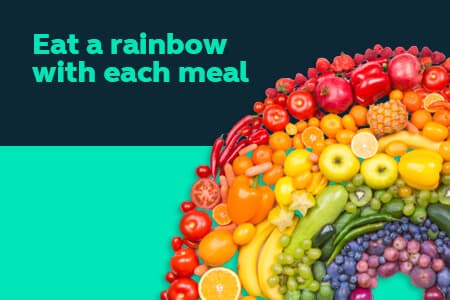
Why do micronutrients and phytochemicals matter?
When our bodies fight an invasion (aka an immune response), they boost the production of chemical molecules. These chemicals have one goal: to kill the invaders. This leads to the formation of free radicals (damaging molecules). If free radicals aren't controlled, they can damage tissues and even cells. Inflammation increases and, over time, this becomes a chronic disease in our bodies.
How do we fix this?
Our bodies have a built-in fail-safe. These clever machines we live in create other molecules to work against the damage. Antioxidants (the name we give to these antioxidising molecules) can interact safely with free radicals. Antioxidants neutralize free radicals. Your body can make antioxidants. Amazing, right? But only if you feed it with a healthy diet. We also get ready-made anti-oxidants and anti-inflammatory molecules (phytochemicals) directly from the fruit and vegetables we eat.
The shopping list
Now you know the science, you're going to want to include the following vitamins and minerals in your diet to boost your immune system:
Zinc
Selenium
Vitamin C
Vitamin A
Vitamin E
Vitamin D
Monica has broken down each category below, making it easy to work out how to get the vital vitamins into your meals. You can start giving your immune system a boost today.
Zinc
Getting zinc into your body can be done by eating any of the foods in the image. Whether you choose to get it through your porridge oats in the morning, eggs at lunch, or chicken, meat, or legumes in the evening. Zinc isn't just great for the immune system, it also helps with the wound-healing process and supports growth and development in children.
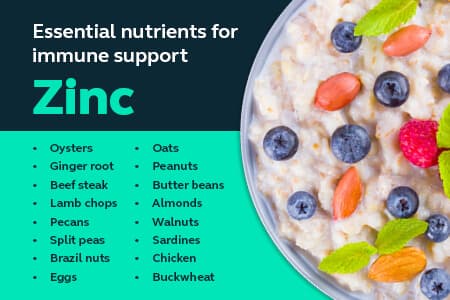
Essential nutrients for immune support - zinc:
Oysters
Ginger root
Beef steak
Lamp chops
Pecans
Split peas
Brazil nuts
Eggs
Oats
Peanuts
Butter beans
Almonds
Walnuts
Sardines
Chicken
Buckwheat
Selenium
Selenium is vital for your immune system, being a big antioxidant. Brazil nuts are a brilliant way to get the nutrients, but it's always good to mix up the sources as selenium content can vary based on where the plant grew and the conditions it grew in2. Most people can get the recommended amount of selenium through food, but be wary, processed foods may destroy it.
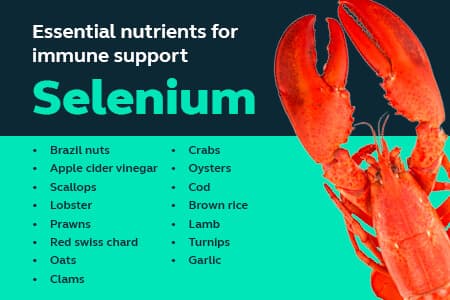
Essential nutrients for immune support - selenium:
Brazil nuts
Apple cider vinegar
Scallops
Lobster
Prawns
Red swiss chard
Oats
Clams
Crabs
Oysters
Cod
Brown rice
Lamb
Turnips
Garlic
Vitamin C
When you think of vitamin C, your head almost always goes to oranges and orange juice. Which is fair enough. You get vitamin C in both of them, but there are a whole host of other foods you can get the vital vitamin from as well. As long as you follow Monica's rainbow, you'll get some vitamin C. Follow the list in the image, including the likes of red peppers, cauliflower, red cabbage, and broccoli on your plate.
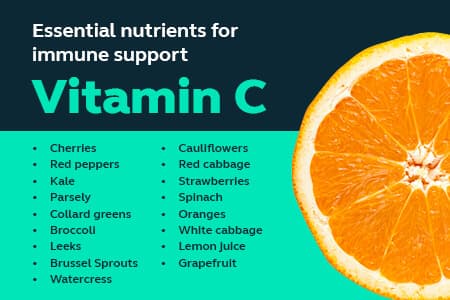
Essential nutrients for immune support -
vitamin C:
Cherries
Red peppers
Kale
Parsley
Collard greens
Broccoli
Leeks
Brussel sprouts
Watercress
Cauliflowers
Red cabbage
Strawberries
Spinach
Oranges
White cabbage
Lemon juice
Grapefruit
Vitamin A
Much like vitamin C, vitamin A follows the rainbow trend. Red pepper, sweet potato, and butternut squash all contain levels of vitamin A. If you're looking to add some greens, you can go for kale and spinach. And if it's fruit you're after, apricots and nectarines also have levels of vitamin A,. Basically, you have plenty of sources.
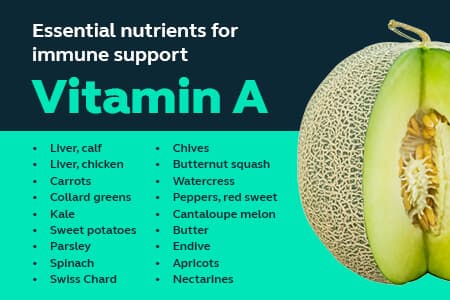
Essential nutrients for immune support -
vitamin A:
Liver, calf
Liver, chicken
Carrots
Collard greens
Kale
Sweet potatoes
Parsley
Spinach
Swiss chard
Chives
Butternut squash
Watercress
Peppers, red sweet
Cantaloupe melon
Butter
Endive
Apricots
Nectarines
Vitamin E
Almonds, peanuts, and pecans. That's a snack-pot right there. It's also a nice amount of vitamin E, another very important immune system booster. It isn't just the nuts you find it in either. Salmon, brown rice, and asparagus all contain vitamin E.
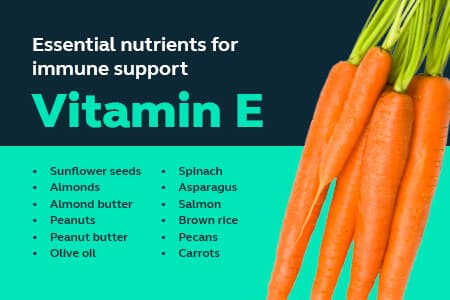
Essential nutrients for immune support -
vitamin E:
Sunflower seeds
Almonds
Almond butter
Peanuts
Peanut butter
Olive oil
Spinach
Asparagus
Salmon
Brown rice
Pecans
Carrots
Vitamin D
The good news is you can get most nutrients from those beautiful, bright fruit and veg. The bad news is not vitamin D. The only ways to get a good level of vitamin D is to either take supplements or get out in the sun.
Monica explains: “Vitamin D plays a crucial role in modulating the immune response." For most of us, levels of vitamin D go down in the winter months when it is crucial to supplement. Even in the warmer months, if we don't get out, we might not rebuild our vitamin D levels.
Monica points out that you can also have your serum level tested regularly to assess the correct supplementation for you.
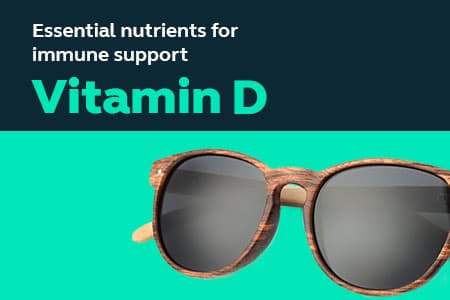
This material may contain links to other websites operated by third parties. It is the responsibility of third parties to ensure such material and websites comply with all relevant laws and regulations. To the maximum extent permissible by law Simplyhealth disclaims all responsibility for such websites.